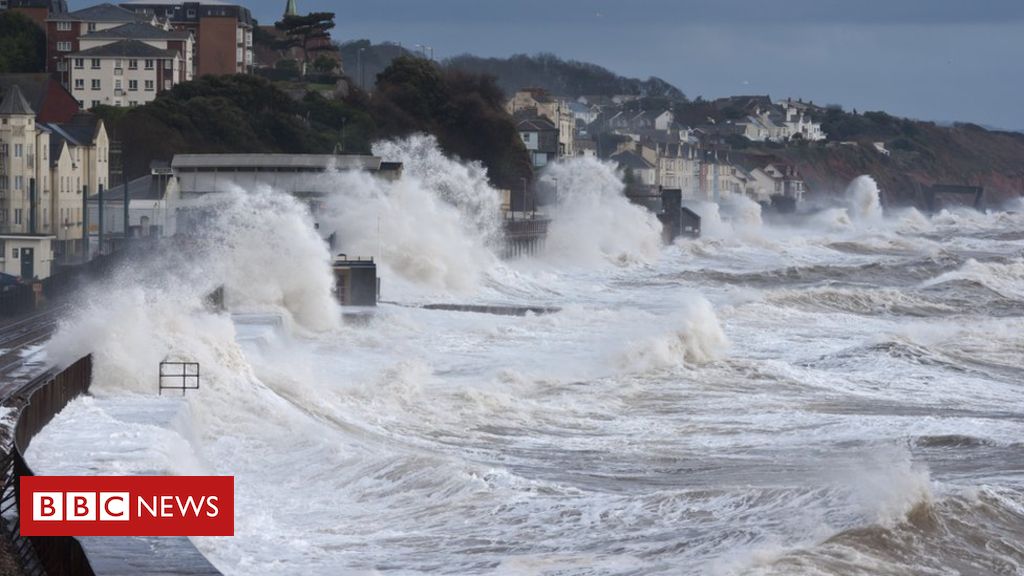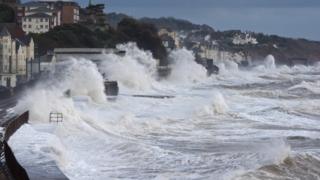Image copyright
Getty Images
Coastal areas in the UK and Northern Europe will experience an increase in “compound flooding” in coming decades say researchers.
These events, where storm surges and heavy rainfall combine, will become more common thanks to rising global temperatures.
Devon, Cornwall and the Bristol channel may become “hotspots” with events seen more than once every six years.
The study is published in the journal Science Advances.
Researchers say that floods on the Avon in Bristol in 2014 and in Ravenna in Italy in 2015 are both good examples of compound events that have caused significant losses to people and property.
These events are marked by a combination of storm surge and heavy rainfall, sometimes driven by the same low pressure system.
Storm surges can be made worse with heavy precipitation but they can also cause trouble by blocking or slowing down the draining of a river into the sea following a period of sustained rainfall.
Despite the fact that they often occur at the same time, risk assessment planners generally see the storm surge and rainfall as separate events.
Image copyright
Getty Images
Increases in rainfall are seen as the key reason for increased compound flooding
This new study uses computer models to asses the current climate, and shows that around 3% of coastal areas experience compound flooding events more than once every six years.
At the moment, these are mainly in the Mediterranean, around the Gulf of Valencia in Spain, Algeria, the Gulf of Lyon in France and in southern Turkey.
The continent wide analysis suggests that the difficulties posed by compound events will increase in a warmer world, and will move to threaten Northern Europe far more than they do at present.
According to the modelling carried out by the team of researchers, “compound flooding is projected to robustly increase along the west coast of Great Britain, Northern France, and along the east and south coast of the North Sea”.
The report say that the fractions of coastlines expected to see return periods of lower than six years is projected to increase from the present 3% to 11% by the end of the century.
“There will be a higher probability of experiencing concurring storm surges and heavy precipitation and these might lead to increased compound flooding especially in river mouths and low lying coastal areas,” said lead author Dr Emanuele Bevacqua from the University of Reading, UK.
“In northern European areas it is mainly drive by changes in precipitation,” he told BBC News.
Image copyright
Getty Images
Hurricane Harvey brought serious compound flooding to Texas in 2017
While the research is broad brush, it does identify hotspots where the return period for compound flooding events will be below the projected six years. These include the Bristol Channel, parts of Devon and Cornwall as well as the Dutch and German North Sea coasts.
The west Norwegian coast near Bergen will see a fivefold increase in potential compound flood frequency.
While the well documented threat from rising seas driven by climate change will increase flood risk in many parts, the researchers involved with this study are at pains to point out that the compound flood threat is an additional threat.
“It is not only changing because of sea level rise, but also because there will be changes in the storminess with higher precipitation intensities which will lead to higher compound flooding in northern Europe,” said Dr Bevacqua.
Other researchers in the field say the question of compound events have been ignored for a long time, mainly because of limitations in statistical tools and computational resources.
“The results are relevant as they point to hotspots where compound flooding may already pose a risk and where it may increase in the future, requiring attention by decision-makers when planning adequate adaptation strategies,” said Prof Thomas Wahl from the University of Central Florida in Orlando, who was not involved in this new study.
“The modelling framework that was used in the study furthermore allows us to disentangle the role of the different compound flood drivers in modulating the future compound flood risk, whether it’s changes in the sea level component, or precipitation, or both.”
Follow Matt on Twitter.




















